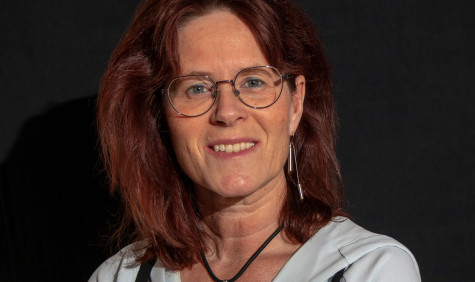By certifying educational components, you can be much more in tune with developments in the labour market.
Edubadges help students raise their profile
Hanze University does not want anyone to leave without a recognised qualification. Edubadges fit seamlessly into this ambition, whether it is recognition for taking a single module or demonstrating acquired skills.
In every educational institution, there are outstanding students walking around. These students are always willing to go the extra mile in a group project. They work harder than the rest to ensure that the result is just that little bit better. This is also the case at Hanze University Groningen, where students often work together in interdisciplinary innovation workshops. Some students learn a lot from this and show it. It would be great if employers could see who are the true excelers in interdisciplinary cooperation, thinks Tineke Kroontje, programme manager of flexible education at Hanze UAS. You can't tell from a diploma.
She says: "The professional field is placing increasing emphasis on interdisciplinary collaboration skills. It would be very valuable if students could show that they make a real impact by working interdisciplinary. We would very much like to value that with an edu badge. Of course, to do this we first need to think carefully about exactly how that demonstration will take shape.'
A suitable learning route for everyone
Edubadges are an urgent topic for Hanze University. Of the three ambitions mentioned in the strategic policy plan, the first and most important is that everyone who wants to learn is given a suitable learning route, with recognised qualifications. 'We don't want anyone to leave without a recognised qualification, even if they haven't followed a full route,' Kroontje explains. Issuing edubadges is in line with this ambition. Although the numbers of edubadges issued are currently small, the ambitions are high. 'We think paper certificates are out of date. Moreover, we want to give recognition for achievements that are not necessarily on the diploma, such as skills and extracurricular activities.'
Experimenting with edubadges
The institution has been involved since SURF's first pilot with edubadges. Kroontje is the driving force behind all experiments Hanze UAS has conducted with edubadges so far. The pilot was a nice first opportunity to test out different forms, such as the awarding of edubadges for extracurricular education, partial education and newly acquired skills. For instance, students nominated for an entrepreneurship award in the pilot received an edu badge. 'They were very enthusiastic about that, because they could show to the outside world that they had something to offer in the field of entrepreneurship,' Kroontje says. Hanze University also experimented with edubadges for taking modules. Particularly part-time students who only followed one module were happy with the recognition. Students who completed an entire programme saw less value in edubadges for modules.
Added value in profiling
The pilots and interviews with students show that there is particular added value in issuing edubadges for components that allow students to profile themselves to the outside world. The moment edubadges were offered as a service by SURF, Hanze UAS started using the form that came out best during the pilot project: issuing edubadges for subjects that are not on the diploma, but which employers endorse as having added value. Taking part honours education is one such form. Kroontje says: "Our honours education consists of six honours labs. Many students quit after three or four honours labs. We also want to give these students a qualification so that they benefit from taking honours education.' Students from other institutions who take a Kies Op Maat minor at Hanze University will soon be able to count on an edu badge instead of a paper certificate. Many discussions are also taking place at the Hanze about recognising skills.
More drum roll needed
As a pathfinder, she 'recruited' courses for the pilots (as far as necessary), implemented the edubadges service within her institution and hired a functional administrator. She notes that edubadges could still use a bit more drumbeat. 'People are busy and this is yet another thing that comes along. Then the first reaction is always: why are we actually doing this? That makes sense. At the same time, there are also people knocking on our door. The honours programme, for instance, was very keen to start using edu badges.'
Asked about difficult choices, she mentions the times she had to disappoint colleagues. 'Sometimes I am approached by people who want to issue an edu badge for participating in a project, but we don't do that. We only award badges if you have demonstrated something, whether through a test or some other achievement. Otherwise, the value of the badge is diluted. There is some understanding for that.'
Better connection to the labour market
Hanze University also participates in the microcredentials pilot of the Flexibilisation Acceleration Zone. This pilot involves 32 institutions working together on a system in which education is certified separately in smaller units, at a recognisable and identifiable value. The pilot uses SURF's edubadges service. Within the Flexibilisation Acceleration Zone, Kroontje represents her institution. 'The microcredentials pilot fits very nicely into the programme appropriate learning routes that I am pulling together with a colleague. For flexible education for professionals, microcredentials are the ideal form of assessment. Ideally, our trainees will be able to stack modules from different educational institutions in the future.'
Kroontje hopes and expects that in 10 years' time, vacancies will not only ask for degrees, but also for microcredentials in smaller areas. 'An education is not a perfect reflection of jobs. With microcredentials, you can match developments in the labour market much better. I hope students will start looking around: where do I want to work, what do I find interesting and which microcredentials are important to fulfil that function?'
Text: Marjolein van Trigt
